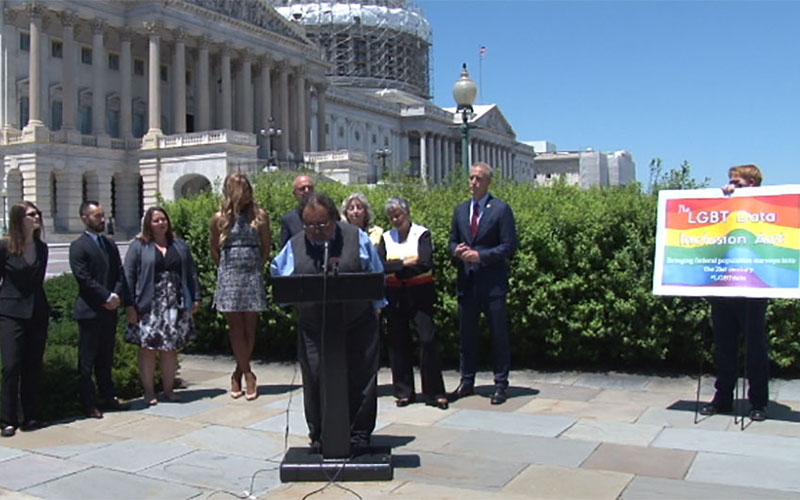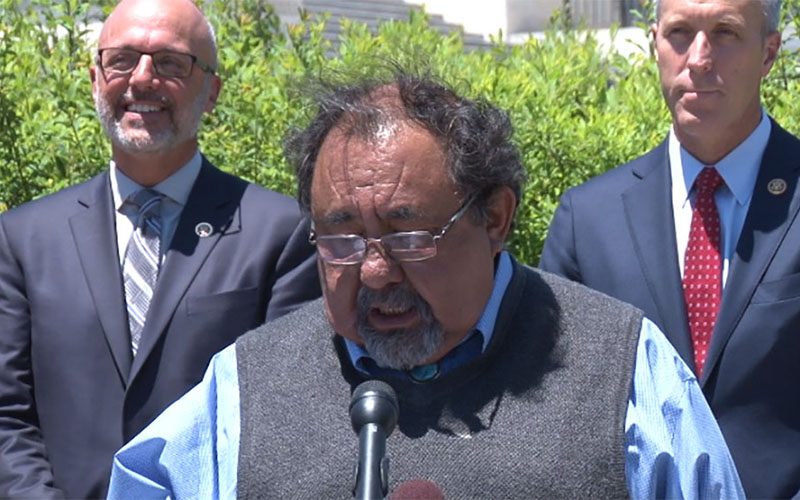
Laverne Cox, the transgender actress who plays a transgender inmate in the Netflix series “Orange is the New Black,” joined those supporting the LGBT Data Inclusion Act. (Photo by Meghan Finnerty/Cronkite News)

The LGBT Data Inclusion Act already has 80 co-sponsors in the House, where it was introduced last month by Rep. Raul Grijalva, D-Tucson. (Photo by Meghan Finnerty/Cronkite News)

Rep. Raul Grijalva, D-Tucson, at a Capitol event in support of his bill to make federal agencies let people add their sexual orientation and gender identy to federal forms. (Photo by Meghan Finnerty/Cronkite News)
WASHINGTON – The federal government does not have accurate data on lesbian, gay, bisexual and transgender individuals, and guessing is no longer good enough at a time when LGBT issues are grabbing headlines, lawmakers said this week.
“If you’re not on paper, you’re invisible when it comes to the federal government,” said Rep. Xavier Becerra, D-California.
He was speaking in support of a bill, sponsored by Rep. Raul Grijalva, D-Tucson, that would require that the government let people voluntarily designate their sexual orientation or gender status on federal forms that collect demographic.
Grijalva and Becerra were joined Thursday by about 20 other lawmakers and by Laverne Cox, the transgender actress who plays a transgender inmate in the Netflix series, “Orange is the New Black.”
“We know that it is not always safe to identify as LGBT,” Cox said. But she noted that the bill would only allow identification, not require it, and that it includes language mandating confidentiality for individuals who do identify themselves to the government.
“People can confidentially disclose whether … they are LGBT,” Cox said. “I think that’s a very important aspect of this legislation that people should know about, so that we should be safe, we can just get data to tell a more inclusive picture of who we are.”
The LGBT Data Inclusion Act would require that any federal agency that “collects information through a survey that includes demographic data” reported by an individual or reported by a person for a household – as in the Census – would allow people to include their LGBT status on the form.
It also requires that any government report using that demographic data include sexual orientation and gender identity information.
A Census Bureau official said Friday that the agency does not take a position on legislation.
But advocates said having that data could help LGBT individuals in everything from education policy to workforce development.
“In a time where many Americans are still struggling economically, the data that we do have suggest that LGBT people are more vulnerable to poverty,” said Laura Durso, senior director at the Center for American Progress, during a briefing on the bill earlier this month.
“But we really don’t know the best ways to serve the community and what the contours of what the economic insecurity looks like,” she said. “These types of data would help make sure that the economic recovery is working for everyone.”
Durso said the bill is important because “you really don’t count if you?re not counted” – a sentiment echoed by many of the speakers at Thursday’s event in the shadow of the Capitol.
“Seems to me we ought to show up on a census,” said Rep. Sean Maloney, D-New York, who is gay.
The bill has 80 cosponsors in the House, including Arizona Democratic Reps. Kyrsten Sinema and Ruben Gallego, and supporters are hopeful that it will pass – if not in this Congress, then in a future one.
“This legislation is so simple,” Becerra said.
It simply says, ‘Let’s just keep tabs of all of our different communities,’ so that when we make decisions in an institution like this where policy is so important we know we’re making it based on the right information,” he said.
-Cronkite News video by Meghan Finnerty